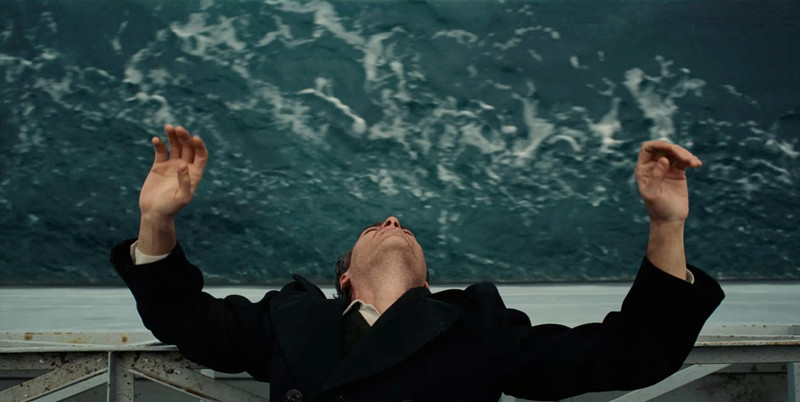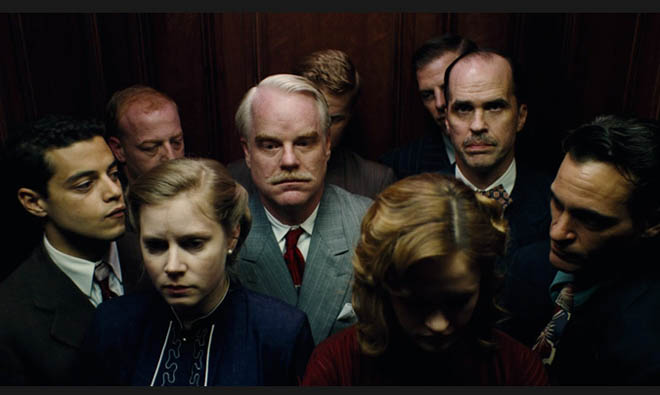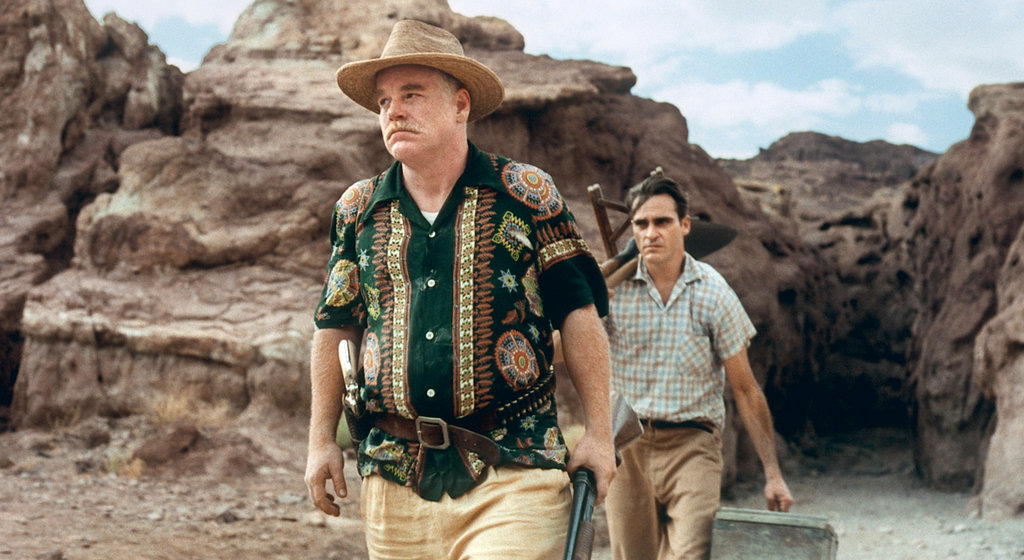
The Master begins with a group of men doing what they end up doing with too much time and nothing to do: drinking, wrestling, talking about their privates, and creating a naked woman out of sand. One man takes it a little too far, exciting himself a little too realistically, and ends up masturbating into the ocean. From other shots of him drinking himself under the bar, seeing every Rorschach blotch in terms of virility, and a gruff interaction with an army doctor wanting to know about his dreams, we get a picture of a man who has never had a serious thought about life in his entire…well…life.
Freddie Quell (Joaquin Phoenix) is a navy man and a drifter, a lost soul. He jumps from alcohol tinged job to alcohol infused job. After poisoning a farm worker with his own alcoholic brew, he hops onto a ship where some form of party is taking place, only to wake up the next day and learn that he had to be subdued out of aggression. He quickly finds out that he has entered a cult. The cult leader, Lancaster Dodd (Philip Seymour Hoffman), describes himself as “a writer, a doctor, a nuclear physicist, a theoretical philosopher, but above all I am a man.” The film documents the story of these two men; their entanglement, their fights and their love, their anger and their hope.
Much has been speculated about the influence of Scientology on this movie (although supposedly Paul Thomas Anderson is quite tired of the comparisons). This is, perhaps, one valid interpretation. However, the film can be viewed in a broader, more capacious way. To boil it down to one particular story is simplistic and particular, and bastardizes a human story; one in which there is frustration and despair, desire and want, creation and destruction, angst and hope. It is the universal story; how do you make sense of both yours and the worlds existence, and how do you reconcile the two? And after this, how are you supposed to live?
Albert Camus was a French philosopher who lived from 1913-1960. Two of his most famous works, The Stranger and The Myth of Sisyphus, are classics of a style of philosophy called existentialism. The core tenet of existentialism is that, in the phrasing of Jean-Paul Sartre, existence precedes essence. There is no ultimate type or ideal human that you are supposed to be. There is no universal you are trying to grasp at. You can decide who you are and what you do. It starts with the particular, with you as an individual.
Existentialism is opposed to essentialism, which is the idea that there is an ideal Form of human being that you should be trying to attain. This school of thought derives from Plato. He believed that there are universal Forms beyond the material realm that all classes of objects participate in. For instance, there are many different kinds of particular horses. The reason we categorize them all as horses is because they all participate in this essence of horse-ness. It starts with the universal.
Essentialism is top down, and existentialism is bottom up. An overly simplistic way to describe it is that fridge magnet that reads, “Life isn’t about finding yourself, it’s about creating yourself.” There is no you out there you are trying to discover and live up to. You are, right now, creating yourself by every choice you make.

This view has many different logical outcomes, which go by many different names. For Camus, it was referred to as absurdity. In The Myth of Sisyphus, Camus lays out his vision of absurdity. He writes that, “This divorce between man and his life, the actor and his setting, is properly the feeling of absurdity.” Alienation is a common theme in Camus’ thought. There is a disconnect between humanity and their existence; a sense of ennui that is embodied in a constant drum beat of what would colloquially be “going through the motions.” To never really feel that you belong, the feeling that you never quite fit in anywhere, or that you are just going along with what everybody else is doing while never feeling truly connected or invested in your existence; this is the sentiment he is describing as absurdity.
This is made worse by the fact that the universe does not give us meaning. Camus writes, “I don’t know whether this world has a meaning that transcends it. But I know that I cannot know that meaning and that it is impossible for me just now to know it.” The absurd is the confrontation of trying to live in a world with no meaning or purpose. This is also what the title of the book is a reference too. Sisyphus was punished by being forced to roll a boulder up to the top of a mountain, only to never have it reach the top. Camus uses this myth as a metaphor for the fruitless labor of attempting to discover ultimate Truth. We are incapable of understanding and knowing everything there is to know and living life correctly. What results is absurdity.
Because of this emphasis on the unknowability of absolute truth and the right path for living, existentialism emphasizes possibility and creation. When there is no right path for your life, you are free to be whoever it is you want to be. You can live the life you desire.
When Freddie first meets Dodd the morning after he jumps on his ship, Dodd invites him to his daughter’s wedding which is happening later that day on the boat. The last thing he tells him is that his memories are not invited. With this statement, Dodd is allowing him to create himself anew. Freddie is no longer a prisoner to his past, he can break free of what is holding him back and create (become) a new self; the self he wants to be. In a scene that shortly follows we see the difference between who Freddie believes himself to be and who he actually is, as we have seen in the film thus far. Therefore, this temptation to create a new self keeps him on board the ship, continuing to pull him along with this new group he has discovered.
The most poignant scene of the movie happens in the desert. Dodd brings Freddie, his daughter and her fiancé, and a motorbike. In a beautifully shot scene, Dodd tells them to pick a point on the horizon, and drive towards it as fast as they can. It’s exhilarating. The sun glides off of them. The crisp, dusty air breaking open for them as they ride. Freddie doesn’t want to come back, he keeps going. He wants to leave the familiar behind, and rush on towards the future, towards what is next, towards hope and freedom.
In a world of uncertainty, where no path is absolutely right, where no world view has all the answers, isn’t this what we do? We pick a point and we go. Who knows if it’s right, who knows where it will take us, who knows if we hit a bump along the way and fall off? It’s human existence. Isn’t that the only thing we can do?

It is worth quoting here what Dodd says to Freddie near the end of the movie:
“Freddie, sailor of the seas. You pay no rent, free to go where you please. Then go, go to that landless latitude, and good luck; for if you figure a way to live without serving a master, any master, then let the rest of us know, will you? For you’d be the first person in the history of the world.”
Compare this with a quote from Camus’ novel, The Fall:
“Ah, mon cher, for anyone who is alone, without God and without a master, the weight of days is dreadful. Hence one must choose a master, God being out of style.”
World views and ideological constructs are a type of home. They are an identity which gives us a sense of self and direction in the world. Dodd is telling Freddie here that he has no home, no identity. Freddie is wandering through life, he has no clear ideas about the reality of the world or his existence, or about how people should live their lives. He is free to go where he pleases, by which Dodd means that Freddie is free to jump from one way of life to another; he has no commitments, he is the absurd man.
The second half of what he tells Freddie is important, and illuminates another important aspect of Existential thought. Most people do not want to do the hard work of discovering reality as it is, or changing the way they live. Most of us fall into patterns and routines that we have inherited from our parents and friends, our cultural mores and values. Most people do not think that deeply about what they do or why they do it, they go through the motions, believing themselves to be thinking actors who knowledgeably and justifiably do what they do.
This is a paradox we cannot get out of. To a certain extent, we inherit these ways of living from everyone around us. It is impossible to completely separate ourselves from them. If we were able to do that, we would suddenly stop living. In this sense, we all have masters. To live without a master is to be so radically different from those who came before you as to be almost alien.
But others will fall into line with no thought at all. It might be that their identity is so strongly tied to a single person that they will believe everything they are told by that person. For others it might be a movement, or a cause, or ideology. Human beings were not made to handle too much uncertainty, because it is impossible to live with it. It can be more comforting to forfeit your own critical thinking skills and follow along with a group, losing your sense of self in identifying with those around you.
Freddie never quite fits in with Dodd’s group, The Cause. He doesn’t really think about it. He finds the group, discovers how he can fit in with them, and plays the part. He tries to do things that he thinks would make Dodd happy, like beating up a skeptic who challenges Dodd for scientific proof at a party. But is he ever really a believer? Does he follow through with their prescribed acts and rituals? Freddie has a tendency to ignore how people tell him he is supposed to act, and so gets ostracized from the group. Freddie has no Master. Or, perhaps, he is his own Master.
The Master is a brilliant film because Anderson takes a familiar archetype, the seeker, and universalizes it. We all grow up within world views; systems that give our life purpose, direction and meaning. But not only that, he alters the end. Freddie never finds what he’s looking for. Our hero is on a quest which never resolves. Sisyphus continues to push the boulder up the mountain. Freddie never finds his answers, but one must imagine him happy.